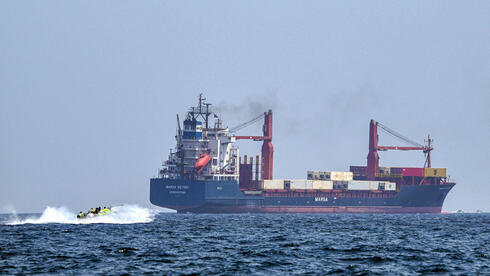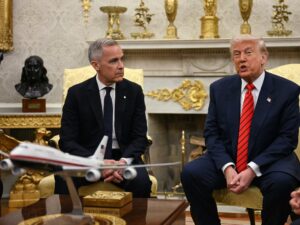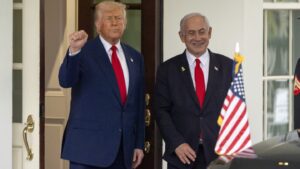
During the recent 12-day conflict between Iran and Israel, global analysts voiced concerns that Iran might close the Strait of Hormuz, a critical chokepoint for 20% of the world’s oil shipments. Despite Iranian officials’ warnings of a potential shutdown, the strait remained open, and the threats had a surprisingly muted effect on global markets.
Middle East analyst Lisa Daftari, in an interview, highlighted how the tepid global response to Iran’s threats underscores the regime’s diminishing influence. “My favorite reaction was by the Chinese leader who said, ‘don’t.’ That was his reaction,” Daftari, editor-in-chief of The Foreign Desk, noted.
Daftari pointed out that even Iran’s closest allies, China and Russia, refrained from supporting it during the conflict. “Even Hezbollah, its own pet project that it gifted 150,000 missiles to, didn’t come to its aid,” she added, emphasizing Iran’s growing isolation.
The Proxy Strategy and Its Challenges
Since the Islamic Republic’s inception in 1979, Iran has relied on proxies to spread its vision of Shia Islam. Daftari explained, “They created their terror proxies, they created Hezbollah in Lebanon, and then we see Hamas in Gaza, the West Bank, you see Palestinian-Islamic Jihad that is supported by them. More recently, the Houthis in Yemen, insurgencies in Iraq and Syria.”
This strategy serves dual purposes: offensively spreading Iran’s agenda and defensively keeping conflicts away from its borders. However, Israel’s recent military actions have targeted these proxies directly. “Israel, with its military capabilities, has diminished its major proxies, the Houthis, Hezbollah, and Hamas,” Daftari said, noting that the conflict has now reached Iranian soil due to the existential threat Iran poses to Israel.
Implications for Regional Stability
Despite the recent conflict, Daftari cautioned that the threat Iran poses is far from over. “For Israel, ensuring that Iran does not have a nuclear weapon is a 24/7 job,” she stressed. The regime’s leaders have been put on notice, with both Israel and the United States showing zero tolerance for a nuclear-armed Iran.
Daftari also criticized media portrayals of the conflict, arguing that they often misrepresent the strategic significance of the military campaign. “One of the most upsetting things is watching reporters attack the accomplishments of this campaign,” she said, emphasizing the importance of unity in addressing national security issues.
Diplomacy and Military Strategy
President Trump’s approach during the conflict, which balanced diplomacy and military action, was seen by Daftari as a strategic move. “Attempted diplomacy, followed by military action, was a smart move to have all options on the table,” she remarked, noting the complexity of dealing with an enemy that employs asymmetrical political warfare.
Prior to the conflict, Iran’s uranium enrichment was progressing slowly. However, following Israeli strikes, there is concern that Iran may accelerate its nuclear ambitions. “They were moving very slowly to not be detected. Now, they might feel that they have to move faster,” Daftari warned.
Voices from the Iranian Diaspora
Many in the Iranian diaspora celebrated the potential for regime change, with pro-monarchy Iranians in Paris waving both Israeli and pre-revolutionary Iranian flags. “These Iranians are happy that the killers of their children are being killed,” Daftari explained, highlighting the complex relationship between the Iranian people and Israel.
Meanwhile, Iranians within the Islamic Republic face a harsh crackdown. “A wounded snake will now come back to bite the people,” Daftari said, describing the regime’s repressive actions against its citizens, including the Jewish community and other religious minorities.
Future Prospects and Regional Dynamics
As the conflict subsides, the modern Arab world, which has grown closer to Israel, is eager to move forward with normalization efforts. Prime Minister Netanyahu and President Trump see the potential for new countries to join the Abraham Accords, fostering peace and prosperity in the region.
Daftari remains optimistic about future Middle Eastern relations, envisioning a day when the Iranian people and Israelis might forge agreements akin to the Abraham Accords. “These are people who have had a long history of collaboration,” she concluded, underscoring the potential for a peaceful future once the current regime is no longer in power.






